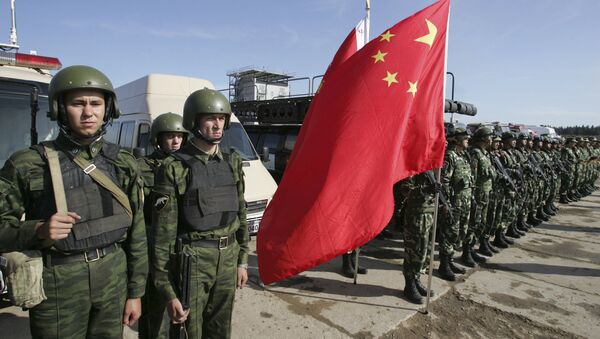Washington's policy in Syria resembles nothing so much as a bipolar individual's dysfunctional behavior, Dr. Christina Lin, a Fellow at the Center for Transatlantic Relations at SAIS-Johns Hopkins University and former director for China policy at the US Department of Defense, notes.
"In Syria, America appears to be waging a proxy war against itself as CIA-armed Islamist rebel groups fight Pentagon-armed Syrian Democratic Forces (SDF) on the plains between Aleppo and the Turkish border. These groups have also fired CIA-supplied TOW anti-tank missiles against Pentagon-backed SDF fighters in northern Aleppo," Lin writes in her Op-Ed for Asia Times.
And here's the rub.
The US and China "are at loggerheads on how to counter ISIS [Daesh]," the scholar writes.
"For China, the object is to maintain the stability of the secular Assad regime. They underscore the word 'secular' because it is important to them. For the US, the object is to remove the Assad regime — period," she stresses.
There is also controversy surrounding the US-backed Syrian rebel groups which, as it turned out, sometimes intermingle with al-Qaeda affiliate al-Nusra Front and other Islamist groups on the ground.
The unpleasant truth has been already recognized by the Obama administration. "Yes, I believe there is some co-mingling of these groups," US State Department spokesperson Mark Toner officially admitted.

But that is not all.
"There are an estimated 1,000 ethnic Muslim Chinese fighters affiliated with al-Qaeda in Syria which goes by the name of al-Nusra [Front]. Al-Nusra [Front] is backed by Turkey/Saudi Arabia/Qatar as part of their Army of Conquest. So, essentially the US, Turkey and the Gulf allies are supporting Chinese Uyghur militants from the Turkistan Islamic Party as part of their anti-Assad opposition. They are also providing them with advanced weapons such as TOW anti-tank missiles," Lin reveals.
In light of this, an embarrassing question arises: why does Washington believe that China would join the US-led coalition that supports anti-Chinese militants?
"The Turkish-Uyghur terror network, in addition to fomenting violence across China, has more recently been trafficking terrorists from Xinjiang, through Southeast Asia, and onward to Turkey where they are staged, armed, trained, and then sent to fight… in Syria," Cartalucci noted.
Beijing has no illusions about what will happen next to Syria after ousting Bashar al-Assad. Once the legitimate government in Damascus is toppled Syria would become a terror hotbed, just like Afghanistan or Libya. And it means the Islamist Uyghur militants would use it to launch terror attacks against the Chinese homeland.
"Is all this the result of a western blind spot or willful blindness?" Lin asks rhetorically.
What the world needs is a comprehensive, not schizophrenic approach to what is going on in the Middle East, the scholar emphasizes.
On March 29, 2016 China appointed a new special envoy for Syria — career diplomat Xie Xiaoyan who previously served as an ambassador to Iran, Ethiopia, and the African Union.
Lin stresses that it's hardly surprising that Beijing has adopted a new enhanced foreign strategy in the Middle East, since the region remains one of China's sources of hydrocarbons.
"This contrasts to the US schizophrenic approach — e.g. the US fighting al-Qaeda in Afghanistan while arming al-Qaeda affiliates in Syria, arming Shiite militia in Iraq while arming Sunni militia against them in Syria. To boot, the US is arming Syrian Kurds fighting ISIS [Daesh] while selling new weapons to Turkey to bomb the Iraqi Kurds fighting ISIS [Daesh]," she remarks.





